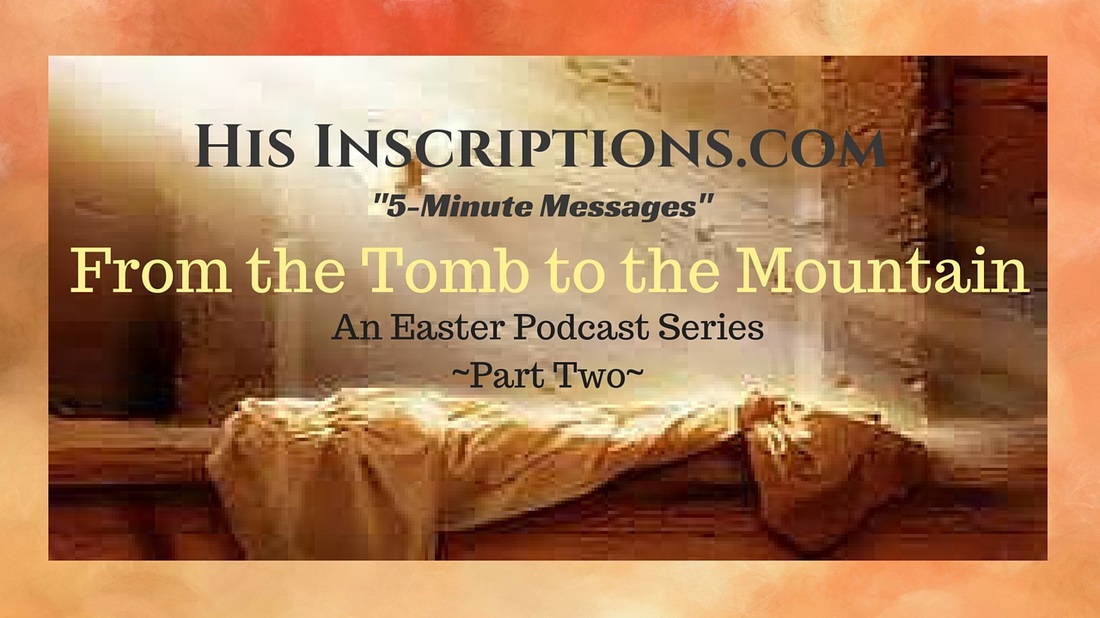|
The crucifixion of Christ is a reminder that all of us have to deal with times of death in our lives. We may have to face the death of a loved one, or the death of a dream, or the death of a hope we hold dear. At some point, we all come to our tombs, as Mary did in the resurrection story, and we have to confront the harsh realities of our mortality.
I believe there are two responses we can have when we reach these tombs. We can meet them in faith or we can meet them with fear. In Part One of this series (read here), we looked at Mary Magdalene’s response in Matthew 28. We saw that she positioned herself by faith at the last place she had seen Jesus. She waited by His tomb. She and many other women were not afraid to follow Christ to His death, while most of the other disciples fled.
Because Mary bravely confronted her fears at Christ’s tomb, she was given the unusual joy of being the first person to hear of His resurrection. Jesus visited her in her darkest hour and gave her a new commission: to go and tell the disciples that He had risen. We know that Christ’s goal for the disciples was similar: He had told them He would rise from the dead and meet them on the mountain in Galilee. This was the planned location for the Great Commission. Unfortunately, the disciples’ response was different from Mary’s. The Fearful FewAt the time of Christ’s death, all but John scatter and go into hiding. Like us, their feelings get in the way of their faith. Luke says that when Mary arrives to tell the disciples of her visitation, they are hiding behind locked doors for fear of the Jews, “mourning and weeping.” (Luke 24:10). When they hear her message, it seems to them like an “idle tale.” They are too hopeless and heartbroken to really listen. Their own emotional pain blinds them to spiritual truth. Their response reminds me of Elijah, who hid in a cave because Jezebel was trying to kill him. It reminds me of David hiding in a cave from King Saul. I’m not knocking them. It’s what we do when we are confronted with our fears, whether in the form of death, disease, or disappointment. It is human nature to want to hide out in a cave or a tomb when we are afraid. Think about how the disciples are feeling. The leader they followed for three years, the One in whom they placed their hope for a new and better Kingdom, is dead. They gave their lives to Christ’s spiritual “campaign trail,” and suddenly Jesus lost the popular vote to Barabbus. Even worse, their obvious frontrunner was crucified. The campaign suddenly stops, and despite Jesus’s prophetic forecasts, they are left without a cause and without a leader. What’s more, any hope they might have retained of Jesus coming back is quenched immediately by a false report the enemy promotes. Soldiers guarding the tomb are paid by the Jewish religious leaders to spread rumors that the disciples themselves have stolen the body of Christ from His tomb, hoping to “manufacture” a resurrection story. In a place of extreme grief and sadness, they are attacked and discredited. For the disciples, things seems much worse than they did for Mary. They have left everything and have nowhere else to go. In one divine blow, all their expectations of what they thought Christ would do are destroyed. They are stuck at the tomb. Despite many confirmations of the resurrection, when Jesus finally appears to the disciples, they are terrified. Luke 24:37 says they think they are seeing a ghost. Matthew 28:17 says some of them still doubted. It takes a lot for us to overcome doubt and unbelief. We can be in a place of double-mindedness sometimes. When we’re this crushed, some of us, like Thomas, need to see and touch before we believe. Some of us, like Peter, believe but are still so disappointed in ourselves that our restoration takes a little bit longer. We need our Savior to speak words of healing to us before we can be recommissioned. (See John 21:1-25). Fortunately, Jesus is as patient and loving with us as He was with Peter, walking us from our tombs of despair to our mountaintops of glory. To us, Jesus says, “Why are you troubled? And why do doubts arise in your hearts?” (Luke 24:38) “Do not be unbelieving, but believing.” (John 20:27). Moving from the tomb to the mountain is a process. We must overcome the same obstacles the disciples did: the lies of the enemy, our own fears and emotions, and unbelief. In the end, the disciples do arrive at the appointed mountain in Galilee, where they receive the Great Commission. But it isn’t without heaven’s help. God used both angelic and human messengers to reach the doubting disciples. When that didn’t work, He appeared to them Himself to strengthen their faith. God never intends for the tombs of this life to be our final end. When I read the resurrection story, I see some who respond in faith and some who respond in fear. But in both cases, I also see the incredible love of a Savior who does everything in His power to convince, encourage, and heal those who love Him. No matter how deep a cave you dwell in, Jesus comes to pull you out. No matter how dark the depression, your Savior can still heal. Because Jesus lives, every tomb can become a place of resurrection when you believe.
Please pray with me:
Father, I thank you that you are close to the brokenhearted. This life confronts us with many tombs of death and lost hope. We need Your resurrection power to roll away the burdens that crush us. We need your love to fill us again with faith and hope for the future. Where we have had wrong expectations of You, please forgive us. Where we have resented You for difficulties only the enemy could create, have mercy on us. Show us, today, what post-resurrection life looks like. Rekindle the dreams You have put in our hearts, so that we are not unbelieving but believing. I pray for every reader that demonic roots of depression and fear will be broken in your lives, and that from this point forward, you will be empowered to come out of your hiding places and move from your tombs to your mountains. I thank you, Lord, that You are the Author and Finisher of our faith, the Great Shepherd who never abandons His sheep. Bring us to our mountaintops. Release our commissions. And may Your hand rest upon us so we can do mighty works in Your Name. Amen.
c. Deborah Perkins / His Inscriptions
Deborah Perkins is the founder of His Inscriptions, a ministry focused on life-giving communication with God. Through her website, inspired teaching and a weekly blog, Deborah offers discipleship to those who want to grow their relationship with God. A ministry leader for over 25 years, Deborah is an experienced prophetic counselor, marriage mentor, and prayer warrior. She's also fond of her hubby, 3 sons, and dark chocolate - in that order!
|
Free Link to the Subscriber Resource Library when you join His Inscriptions!
About
Deborah Perkins Categories
All
Archives
June 2024
AuthorA severe hearing loss from childhood caused Deborah Perkins to develop what she now calls her secret weapon: tuning in to God's voice. A Wellesley College graduate and an award-winning writer, Deborah is now a wife and mother of 3 boys. Deborah has devoted over 25 years to professional and lay Christian ministry in New England and beyond. Her passion is inspiring people to cultivate greater intimacy with God. |



 RSS Feed
RSS Feed






